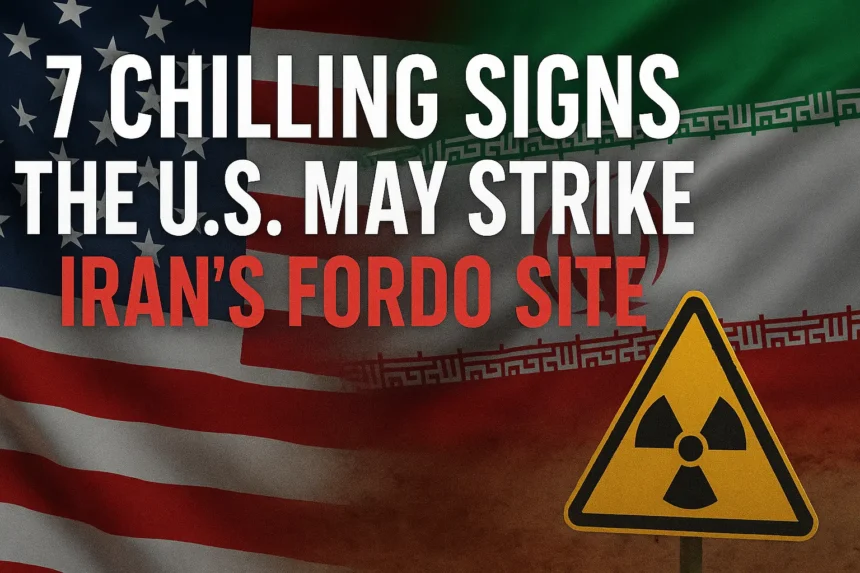US May Strike Iran’s Fordo Site Amid Rising Global Tensions
The Fordo nuclear facility has once again ignited fears of a major conflict. With rising uranium enrichment levels and mounting U.S. concerns, whispers of a potential strike are growing louder. As diplomacy weakens and tensions flare, all eyes are now on what could become the world’s next flashpoint — deep beneath Iran’s mountains.
Tensions Boiling Beneath the Surface
Tensions between the United States and Iran are simmering once again — and this time, the spark is the Fordo nuclear facility. Recent intelligence chatter, diplomatic whispers, and military posturing have drawn sharp global focus back to Iran’s controversial nuclear ambitions.
Could a U.S. intervention really be on the horizon? Or is this just another high-stakes geopolitical bluff?
Let’s break it down.
1. The Fordo Facility: Why It’s a Global Flashpoint
Hidden deep inside a mountain near Qom, Iran’s Fordo nuclear facility is one of the most fortified nuclear sites in the world. Initially kept secret from international regulators, Fordo is capable of enriching uranium to weapons-grade levels — a serious concern for world powers.
Recent reports suggest that Iran has resumed uranium enrichment at levels far beyond the JCPOA (Joint Comprehensive Plan of Action) limits — setting off alarm bells in Washington, Tel Aviv, and beyond.
2. Unveiling the Red Lines: What the U.S. Will Not Tolerate
For Washington, a nuclear-armed Iran remains a hard red line. With Israel pressing against diplomatic delays and Gulf allies raising alarms, pressure is rapidly building on the U.S. to take decisive action if negotiations break down.
The Trump administration has reasserted its hardline stance, vowing to prevent Iran from acquiring nuclear weapons at all costs. Recent satellite imagery and intelligence reports suggest the “point of no return” may be dangerously near — leaving fewer options on the table.
Expert Insight:
If Iran continues to enrich uranium at this rate, we could be weeks away from breakout capability. — Former CIA Analyst, 2025 testimony.
3. Shadow Wars in the Open: Cyberattacks, Sabotage & Drones
Behind the headlines, a quieter war is already raging. From Israel’s alleged sabotage missions inside Iran to U.S.-backed cyberattacks crippling enrichment programs, the tension is no longer hypothetical — it’s kinetic.
The risk? Miscalculation.
One wrong move, drone strike, or tit-for-tat retaliation could ignite a full-scale regional conflict.
Imagine waking up to news of pre-dawn airstrikes on Fordo, oil prices spiking overnight, and global markets tumbling — the risk is real, and growing.
4. Diplomacy on Life Support: The Nuclear Deal Is Crumbling
The JCPOA was once hailed as a diplomatic victory. Today, it’s a political football.
After the U.S. pulled out of the deal in 2018, Iran began breaching its commitments. Talks in Vienna offered hope, but stalled. Now, with hardliners dominating Iranian politics and U.S. elections approaching, diplomatic windows are closing.
Both sides are digging in. And that makes the prospect of diplomacy succeeding less likely with each passing week.
5. Military Build-up in the Gulf: Preparing for the Worst?
The Pentagon has quietly increased its presence in the Gulf. New naval assets, upgraded missile defenses, and increased air patrols near the Strait of Hormuz are not just deterrents — they’re strategic signals.
The U.S. wants to avoid war. But it’s also making sure it’s ready if it comes.
6. Global Stakes: Oil Markets, Israel, and Trump’s Second-Term Strategy
Any U.S.–Iran conflict would send shockwaves far beyond the Middle East. Oil prices could skyrocket. Israel might act unilaterally. And with President Trump now navigating his second term, a major foreign policy crisis could redefine his administration’s global posture.
Public opinion in the U.S. remains divided. Some support firm military action, while others fear another costly, endless conflict.
In a world already shaken by Eastern European wars and rising Indo-Pacific tensions, another Middle East flashpoint could prove catastrophic — or calculated.
7. What Happens If the U.S. Strikes Fordo? A Nightmare Scenario
A strike on Fordo wouldn’t be a simple affair.
It’s buried beneath 80 meters of rock. Even advanced bunker-buster bombs might not fully destroy it. Iran would retaliate — possibly through proxies in Lebanon, Syria, or even the Red Sea.
Within hours, American embassies, military bases, and global oil shipping lanes could be targeted.
Expert warning:
A direct attack on Fordo could pull in multiple nations and spiral into an uncontrollable regional war. — Middle East security analyst, StratGlobal 2025
What is JCPOA
The JCPOA, or Joint Comprehensive Plan of Action, is the 2015 nuclear deal between Iran and world powers. It set strict limits on Iran’s nuclear program—like capping uranium enrichment at 3.67%, banning enrichment at Fordo, and allowing inspections—to prevent nuclear weapons development while still permitting peaceful nuclear energy use. These limits are known as the JCPOA restrictions.
| Parameter | JCPOA Limit |
|---|---|
| Uranium Enrichment | Max 3.67% purity |
| Centrifuges Allowed | 5,060 IR-1 centrifuges at Natanz only |
| Fordo Facility | No uranium enrichment, R&D only |
| Uranium Stockpile | Max 300 kg (660 lbs) |
| Arak Heavy-Water Reactor | Redesigned to prevent plutonium production |
| Inspections | Regular IAEA monitoring & access |
Final Thoughts: Diplomacy or Disaster?
As the Fordo nuclear facility becomes a ticking clock in the eyes of the world, U.S.-Iran relations are nearing a breaking point. Whether Washington chooses diplomacy, pressure, or precision — one thing is certain: the choices made now will echo for generations.
The world watches. History waits.
Want deeper insights into the Middle East’s evolving power dynamics?
Subscribe for exclusive geopolitical analysis and real-time updates.
Join our newsletter. Explore our global risk briefings
Most read: https://tnheadlines24.com/starship-fireball/
Disclaimer: The views and information presented in this article are based on publicly available sources and expert analysis. TN HEADLINES24 does not endorse or assume responsibility for any specific predictions or viewpoints expressed herein. Readers are advised to interpret the content within the context of ongoing developments.

